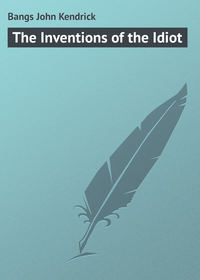 полная версия
полная версияThe Idiot
"You are the worst I ever knew!" snapped Mr. Pedagog.
"Which only proves," observed the Idiot, "that you have not heeded the Scriptural injunction that you should know thyself. Are those buckwheat cakes or doilies?"
Whether the question was heard or not is not known. It certainly was not answered, and silence reigned for a few minutes. Finally Mrs. Pedagog spoke, and in the manner of one who was somewhat embarrassed. "I am in an embarrassing position," said she.
"Good!" said the Idiot, sotto-voce, to the genial gentleman who occasionally imbibed. "There is hope for the landlady yet. If she can be embarrassed she is still human—a condition I was beginning to think she wotted not of."
"She whatted what?" queried the genial gentleman, not quite catching the Idiot's words.
"Never mind," returned the Idiot. "Let's hear how she ever came to be embarrassed."
"I have had an application for my first-floor suite, and I don't know whether I ought to accept it or not," said the landlady.
"She has a conscience, too," whispered the Idiot; and then he added, aloud, "And wherein lies the difficulty, Mrs. Pedagog?"
"The applicant is an actor; Junius Brutus Davenport is his name."
"A tragedian or a comedian?" asked the Bibliomaniac.
"Or first walking gentleman, who knows every railroad tie in the country?" put in the Idiot.
"That I do not know," returned the landlady. "His name sounds familiar enough, though. I thought perhaps some of you gentlemen might know of him."
"I have heard of Junius Brutus," observed the Doctor, chuckling slightly at his own humor, "and I've heard of Davenport, but Junius Brutus Davenport is a combination with which I am not familiar."
"Well, I can't see why it should make any difference whether the man is a tragedian, or a comedian, or a familiar figure to railroad men," said Mr. Whitechoker, firmly. "In any event, he would be an extremely objec—"
"It makes a great deal of difference," said the Idiot. "I've met tragedians, and I've met comedians, and I've met New York Central stars, and I can assure you they each represent a distinct type. The tragedians, as a rule, are quiet meek individuals, with soft low voices, in private life. They are more timid than otherwise, though essentially amiable. I knew a tragedian once who, after killing seventeen Indians, a road-agent, and a gross of cowboys between eight and ten P.M. every night for sixteen weeks, working six nights a week, was afraid of a mild little soft-shell crab that lay defenceless on a plate before him on the evening of the seventh night of the last week. Tragedians make agreeable companions, I can tell you; and if J. Brutus Davenport is a tragedian, I think Mrs. Pedagog would do well to let him have the suite, provided, of course, that he pays for it in advance."
"I was about to observe, when our friend interrupted me," said Mr. Whitechoker, with dignity, "that in any event an actor at this board would be to me an extremely objec—"
"Now the comedians," resumed the Idiot, ignoring Mr. Whitechoker's remark—"the comedians are very different. They are twice as bloodthirsty as the murderers of the drama, and, worse than that, they are given to rehearsing at all hours of the day and night. A tragedian is a hard character only on the stage, but the comedian is the comedian always. If we had one of those fellows in our midst, it would not be very long before we became part of the drama ourselves. Mrs. Pedagog would find herself embarrassed once an hour, instead of, as at present, once a century. Mr. Whitechoker would hear of himself as having appeared by proxy in a roaring farce before our comedian had been with us two months. The wise sayings of our friend the School-Master would be spoken nightly from the stage, to the immense delight of the gallery gods, and to the edification of the orchestra circle, who would wonder how so much information could have got into the world and they not know it before. The out-of-town papers would literally teem with witty extracts from our comedian's plays, which we should immediately recognize as the dicta of my poor self."
"All of which," put in Mr. Whitechoker, "but proves the truth of my assertion that such a person would be an extremely objec—"
"Then, as I said before," continued the Idiot, "he is continually rehearsing, and his objectionableness as a fellow-boarder would be greater or less, according to his play. If he were impersonating a shiftless wanderer, who shows remarkable bravery at a hotel fire, we should have to be prepared at any time to hear the fire-engines rushing up to the front door, and to see our comedian scaling the fire-escape with Mrs. Pedagog and her account-books in his arms, simply in the line of rehearsal. If he were impersonating a detective after a criminal masquerading as a good citizen, the School-Master would be startled some night by a hoarse voice at his key-hole exclaiming: 'Ha! ha! I have him now. There is no escape save by the back window, and that's so covered o'er with dust 'twere suffocation sure to try it.' I hesitate to say what would happen if he were a tank comedian."
"Perhaps," said Mr. Whitechoker, with a trifle more impatience than was compatible with his calling—"perhaps you will hesitate long enough for me to state what I have been trying to state ever since this soliloquy of yours began—that in any event, whether this person be a tragedian, or a comedian, or a walking gentleman, or a riding gentleman in a circus, I object to his being admitted to this circle, and I deem it well to say right here that as he comes in at the front door I go out at the back. As a clergyman, I do not approve of the stage."
"That ought to settle it," said the Idiot. "Mr. Whitechoker is too good a friend to us all here for us to compel him to go out of that back door into the rather limited market-garden Mrs. Pedagog keeps in the yard. My indirect plea for the admission of Mr. Junius Brutus Davenport was based entirely upon my desire to see this circle completed or nearer completion than it is at present. We have all the professions represented here but the stage, and why exclude it, granting that no one objects? The men whose lives are given over to the amusement of mankind, and who are willing to place themselves in the most outrageous situations night after night in order that we may for the time being seem to be lifted out of the unpleasant situations into which we have got ourselves, are in my opinion doing a noble work. The theatre enables us to woo forgetfulness of self successfully for a few brief hours, and I have seen the time when an hour or two of relief from actual cares has resulted in great good. Nevertheless, the gentleman is not elected; and if Mrs. Pedagog will kindly refill my cup, I will ask you to join me in draining a toast to the health of the pastor of this flock, whose conscience, paradoxical as it may seem, is the most frequently worn and yet the least thread-bare of the consciences represented at this table."
This easy settlement of her difficulty was so pleasing to Mrs. Pedagog that the Idiot's request was graciously acceded to, and Mr. Whitechoker's health was drank in coffee, after which the Idiot requested the genial gentleman who occasionally imbibed to join him privately in eating buckwheat cakes to the health of Mr. Davenport.
"I haven't any doubt that he is worthy of the attention," he said; "and if you will lend me the money to buy the tickets, I'll take you around to the Criterion to-night, where he is playing. I don't know whether he plays Hamlet or A Hole in the Roof; but, at any rate, we can have a good time between the acts."
IV
"I see the men are at work on the pavements this morning," said the School-Master, gazing out through the window at a number of laborers at work in the street.
"Yes," said the Idiot, calmly, "and I think Mrs. Pedagog ought to sue the Department of Public Works for libel. If she hasn't a case no maligned person ever had."
"What are you saying, sir?" queried the landlady, innocently.
"I say," returned the Idiot, pointing out into the street, "that you ought to sue the Department of Public Works for libel. They've got their sign right up against your house. No Thorough Fare is what it says. That's libel, isn't it, Mr. Brief?"
"It is certainly a fatal criticism of a boarding-house," observed Mr. Brief, with a twinkle in his eye, "but Mrs. Pedagog could hardly secure damages on that score."
"I don't know about that," returned the Idiot. "As I understand it, it is an old maxim of the law that the greater the truth the greater the libel. Mrs. Pedagog ought to receive a million–By-the-way, what have we this morning?"
"We have steak and fried potatoes, sir," replied Mrs. Pedagog, frigidly. "And I desire to add, that one who criticises the table as much as you do would do well to get his meals outside."
"That, Mrs. Pedagog, is not the point. The difficulty I find here lies in getting my meals inside," said the Idiot.
"Mary, you may bring in the mush," observed Mrs. Pedagog, pursing her lips, as she always did when she wished to show that she was offended.
"Yes, Mary," put in the School-Master; "let us have the mush as quickly as possible—and may it not be quite such mushy mush as the remarks we have just been favored with by our talented friend the Idiot."
"You overwhelm me with your compliments, Mr. Pedagog," replied the Idiot, cheerfully. "A flatterer like you should live in a flat."
"Has your friend completed his article on old jokes yet?" queried the Bibliomaniac, with a smile and some apparent irrelevance.
"Yes and no," said the Idiot. "He has completed his labors on it by giving it up. He is a very thorough sort of a fellow, and he intended to make the article comprehensive, but he found he couldn't, because, judging from comments of men like you, for instance, he was forced to conclude that there never was a new joke. But, as I was saying the other morning–"
"Do you really remember what you say?" sneered Mr. Pedagog. "You must have a great memory for trifles."
"Sir, I shall never forget you," said the Idiot. "But to revert to what I was saying the other morning, I'd like to begin life all over again, so that I could prepare myself for the profession of architecture. It's the greatest profession in the world, and one which is surest to bring immortality to its successful follower. A man may write a splendid book, and become a great man for a while and within certain limits, but the chances are that some other man will come along later and supplant him. Then the book's sale will die out after a time, and with this will come a diminution of its author's reputation, in extent anyway. An actor or a great preacher becomes only a name after his death, but the architect who builds a cathedral or a fine public building really erects a monument to his own memory."
"He does if he can build it so that it will stay up," said the Bibliomaniac. "I think you, however, are better off as you are. If you had a more extended reputation or a lasting name you would probably be locked up in some retreat; or if you were not, posterity would want to know why."
"I am locked up in a retreat of Nature's making," said the Idiot, with a sigh. "Nature has set around me certain limitations which, while they are not material, might as well be so as far as my ability to soar above them is concerned—and it's well she has. If it were otherwise, my life would not be safe or bearable in this company. As it is, I am happy and not at all afraid of the effects your jealousy of me might entail if I were any better than the rest of you."
"I like that," said Mr. Pedagog.
"I thought you would," said the Idiot. "That's why I said it. I aim to please, and for once seem to have hit the bull's-eye. Mary, kindly break open this biscuit for me."
"Have you ideas on the subject of architecture that you so desire to become an architect?" queried Mr. Whitechoker, who was always full of sympathy for aspiring natures.
"A few," said the Idiot.
Mr. Pedagog laughed outright.
"Let's test his ideas," he said, in an amused way. "Take a cathedral, for instance. Suppose, Mr. Idiot, a man should come to you and say: 'Idiot, we have a fund of $800,000 in our hands, actual cash. We think of building a cathedral, and we think of employing you to draw up our plans. Give us some idea of what we should do.' Do you mean to tell me that you could say anything reasonable or intelligent to that man?"
"Well, that depends upon what you call reasonable and intelligent. I have never been able to find out what you mean by those terms," the Idiot answered, slowly. "But I could tell him something that I consider reasonable and intelligent."
"From your own point of view, then, as to reasonableness and intelligence, what should you say to him?"
"I'd make him out a plan providing for the investment of his $800,000 in five-per-cent, gold bonds, which would bring him in an income of $40,000 a year; after which I should call his attention to the fact that $40,000 a year would enable him to take 10,000 poor children out of this sweltering city into the country, to romp and drink fresh milk and eat wholesome food for two weeks every summer from now until the end of time, which would build up a human structure that might be of more benefit to the world than any pile of bricks, marble, and wrought-iron I or any other architect could conceive of," said the Idiot. "The structure would stand up, too."
"You call that architecture, do you?" said Mr. Pedagog.
"Yes," said the Idiot, "of the renaissance order. But that, of course, you term idiocy—and maybe it is. I like to be that kind of an idiot. I do not claim to be able to build a cathedral, however. I don't suppose I could even build a boarding-house like this, but what I should like to do in architecture would be to put up a $5000 dwelling-house for $5000. That's a thing that has never been done, and I think I might be able to do it. If I did, I'd patent the plan and make a fortune. Then I should like to know enough about the science of planning a building to find out whether my model hotel is practicable or not."
"You have a model hotel in your mind, eh?" said the Bibliomaniac.
"It must be a very small hotel if it's in his mind," said the Doctor.
"That's tantamount to saying that it isn't anywhere," said Mr. Pedagog.
"Well, it's a great hotel just the same," said the Idiot. "Although I presume it would be expensive to build. It would have movable rooms, in the first place. Each room would be constructed like an elevator, with appliances at hand for moving it up and down. The great thing about this would be that persons could have a room on any floor they wanted it, so long as they got the room in the beginning. A second advantage would lie in the fact, that if you were sleeping in a room next door to another in which there was a crying baby, you could pull the rope and go up two or three flights until you were free from the noise. Then in case of fire the room in which the fire started could be lowered into a sliding tank large enough to immerse the whole thing in, which I should have constructed in the cellar. If the whole building were to catch fire, there would be no loss of life, because all the rooms could be lowered to the ground-floor, and the occupants could step right out upon solid ground. Then again, if you were down on the ground-floor, and desired to get an extended view of the surrounding country, it would be easy to raise your room to the desired elevation. Why, there's no end to the advantages to be gained from such an arrangement."
"It's a fine idea," said Mr. Pedagog, "and one worthy of your mammoth intellect. It couldn't possibly cost more than a million of dollars to erect such a hotel, could it?"
"No," said the Idiot. "And that is cheap alongside some of the hotels they are putting up nowadays."
"It could be built on less than four hundred acres of ground, too, I presume?" said the Bibliomaniac, with a wink at the Doctor.
"Certainly," said the Idiot, meekly.
"And if anybody fell sick in one of the rooms," said the Doctor, "and needed a change of air, you could have a tower over each, I suppose, so that the room could be elevated high enough to secure the different quality in the ether?"
"Undoubtedly," said the Idiot. "Although that would add materially to the expense. A scarlet-fever patient, however, in a hotel like that could very easily be isolated from the rest of the house by the maintenance of what might be called the hospital floor."
"Superb!" said the Doctor. "I wonder you haven't spoken to some architectural friend about it."
"I have," said the Idiot. "You must remember that young fellow with a black mustache I had here to dinner last Saturday night."
"Yes, I remember him," said the Doctor. "Is he an architect?"
"He is—and a good one. He can take a brown-stone dwelling and turn it into a colonial mansion with a pot of yellow paint. He's a wonder. I submitted the idea to him."
"And what was his verdict?"
"I don't like to say," said the Idiot, blushing a little.
"Ha! ha!" laughed Mr. Pedagog. "I shouldn't think you would like to say. I guess we know what he said."
"I doubt it," said the Idiot; "but if you guess right, I'll tell you."
"He said you had better go and live in a lunatic asylum," said Mr. Pedagog, with a chuckle.
"Not he," returned the Idiot, nibbling at his biscuit. "On the contrary. He advised me to stop living in one. He said contact with the rest of you was affecting my brain."
This time Mr. Pedagog did not laugh, but mistaking his coffee-cup for a piece of toast, bit a small section out of its rim; and in the midst of Mrs. Pedagog's expostulation, which followed the School-Master's careless error, the Idiot and the Genial Old Gentleman departed, with smiles on their faces which were almost visible at the back of their respective necks.
V
"Hullo!" said the Idiot, as he began his breakfast. "This isn't Friday morning, is it? I thought it was Tuesday."
"So it is Tuesday," put in the School-Master.
"Then this fish is a little extra treat, is it?" observed the Idiot, turning with a smile to the landlady.
"Fish? That isn't fish, sir," returned the good lady. "That is liver."
"Oh, is it?" said the Idiot, apologetically. "Excuse me, my dear Mrs. Pedagog. I thought from its resistance that it was fried sole. Have you a hatchet handy?" he added, turning to the maid.
"My piece is tender enough. I can't see what you want," said the School-Master, coldly.
"I'd like your piece," replied the Idiot, suavely. "That is, if it really is tender enough."
"Don't pay any attention to him, my dear," said the School-Master to the landlady, whose ire was so very much aroused that she was about to make known her sentiments on certain subjects.
"No, Mrs. Pedagog," said the Idiot, "don't pay any attention to me, I beg of you. Anything that could add to the jealousy of Mr. Pedagog would redound to the discomfort of all of us. Besides, I really do not object to the liver. I need not eat it. And as for staying my appetite, I always stop on my way down-town after breakfast for a bite or two anyhow."
There was silence for a moment.
"I wonder why it is," began the Idiot, after tasting his coffee—"I wonder why it is Friday is fish-day all over the world, anyhow? Do you happen to be learned enough in piscatorial science to enlighten me on that point, Doctor?"
"No," returned the physician, gruffly. "I've never looked into the matter."
"I guess it's because Friday is an unlucky day," said the Idiot. "Just think of all the unlucky things that may happen before and after eating fish, as well as during the process. In the first place, before eating, you go off and fish all day, and have no luck—don't catch a thing. You fall in the water perhaps, and lose your watch, or your fish-hook catches in your coat-tails, with the result that you come near casting yourself instead of the fly into the brook or the pond, as the case may be. Perhaps the hook doesn't stop with the coat-tails, but goes on in, and catches you. That's awfully unlucky, especially when the hook is made of unusually barby barbed wire.
"Then, again, you may go fishing on somebody else's preserves, and get arrested, and sent to jail overnight, and hauled up the next morning, and have to pay ten dollars fine for poaching. Think of Mr. Pedagog being fined ten dollars for poaching! Awfully unfortunate!"
"Kindly leave me out of your calculations," returned Mr. Pedagog, with a flush of indignation.
"Certainly, if you wish it," said the Idiot. "We'll hand Mr. Brief over to the police, and let him be fined for poaching on somebody else's preserves—although that's sort of impossible, too, because Mrs. Pedagog never lets us see preserves of any kind."
"We had brandied peaches last Sunday night," said the landlady, indignantly.
"Oh yes, so we did," returned the Idiot. "That must have been what the Bibliomaniac had taken," he added, turning to the genial gentleman who occasionally imbibed. "You know, we thought he'd been—ah—he'd been absorbing."
"To what do you refer?" asked the Bibliomaniac, curtly.
"To the brandied peaches," returned the Idiot. "Do not press me further, please, because we like you, old fellow, and I don't believe anybody noticed it but ourselves."
"Noticed what? I want to know what you noticed and when you noticed it," said the Bibliomaniac, savagely. "I don't want any nonsense, either. I just want a plain statement of facts. What did you notice?"
"Well, if you must have it," said the Idiot, slowly, "my friend who imbibes and I were rather pained on Sunday night to observe that you—that you had evidently taken something rather stronger than cold water, tea, or Mr. Pedagog's opinions."
"It's a libel, sir!—a gross libel!" retorted the Bibliomaniac. "How did I show it? That's what I want to know. How—did—I—show—it? Speak up quick, and loud too. How did I show it?"
"Well, you went up-stairs after tea."
"Yes, sir, I did."
"And my friend who imbibes and I were left down in the front hall, and while we were talking there you put your head over the banisters and asked, 'Who's that down there?' Remember that?"
"Yes, sir, I do. And you replied, 'Mr. Auburnose and myself.'"
"Yes. And then you asked, 'Who are the other two?'"
"Well, I did. What of it?"
"Mr. Auburnose and I were there alone. That's what of it. Now I put a charitable construction on the matter and say it was the peaches, when you fly off the handle like one of Mrs. Pedagog's coffee-cups."
"Sir!" roared the Bibliomaniac, jumping from his chair. "You are the greatest idiot I know."
"Sir!" returned the Idiot, "you flatter me."
But the Bibliomaniac was not there to hear. He had rushed from the room, and during the deep silence that ensued he could be heard throwing things about in the chamber overhead, and in a very few moments the banging of the front door and scurrying down the brown-stone steps showed that he had gone out of doors to cool off.
"It is too bad," said the Idiot, after a while, "that he has such a quick temper. It doesn't do a bit of good to get mad that way. He'll be uncomfortable all day long, and over what? Just because I attempted to say a good word for him, and announce the restoration of my confidence in his temperance qualities, he cuts up a high-jinks that makes everybody uncomfortable.
"But to resume about this fish business," continued the Idiot. "Fish—"
"Oh, fish be hanged!" said the Doctor, impatiently. "We've had enough of fish."
"Very well," returned the idiot; "as you wish. Hanging isn't the best treatment for fish, but we'll let that go. I never cared for the finny tribe myself, and if Mrs. Pedagog can be induced to do it, I for one am in favor of keeping shad, shark, and shrimps out of the house altogether."
VI
The Idiot was unusually thoughtful—a fact which made the School-Master and the Bibliomaniac unusually nervous. Their stock criticism of him was that he was thoughtless; and yet when he so far forgot his natural propensities as to meditate, they did not like it. It made them uneasy. They had a haunting fear that he was conspiring with himself against them, and no man, not even a callous school-master or a confirmed bibliomaniac, enjoys feeling that he is the object of a conspiracy. The thing to do, then, upon this occasion, seemed obviously to interrupt his train of thought—to put obstructions upon his mental track, as it were, and ditch the express, which they feared was getting up steam at that moment to run them down.









